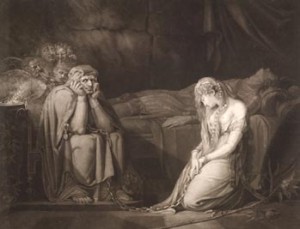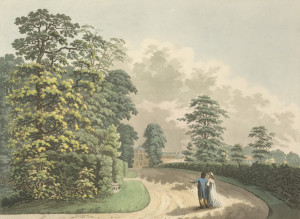After Jane Austen’s dealings with James Stanier Clarke, secretary to the Prince Regent, she wrote The Plan of a Novel, which I will include in its entirety right here.
 SCENE to be in the Country, Heroine the Daughter of a Clergyman, one who after having lived much in the World had retired from it and settled in a Curacy, with a very small fortune of his own. — He, the most excellent Man that can be imagined, perfect in Character, Temper, and Manners — without the smallest drawback or peculiarity to prevent his being the most delightful companion to his Daughter from one year’s end to the other. — Heroine a faultless Character herself, — perfectly good, with much tenderness and sentiment, and not the least Wit — very highly accomplished, understanding modern Languages and (generally speaking) everything that the most accomplished young Women learn, but particularly excelling in Music — her favourite pursuit — and playing equally well on the PianoForte and Harp — and singing in the first stile. Her Person quite beautiful — dark eyes and plump cheeks. — Book to open with the description of Father and Daughter — who are to converse in long speeches, elegant Language — and a tone of high serious sentiment. — The Father to be induced, at his Daughter’s earnest request, to relate to her the past events of his Life. This Narrative will reach through the greatest part of the first volume — as besides all the circumstances of his attachment to her Mother and their Marriage, it will comprehend his going to sea as Chaplain to a distinguished naval character about the Court, his going afterwards to Court himself, which introduced him to a great variety of Characters and involved him in many interesting situations, concluding with his opinions on the Benefits to result from Tithes being done away, and his having buried his own Mother (Heroine’s lamented Grandmother) in consequence of the High Priest of the Parish in which she died refusing to pay her Remains the respect due to them. The Father to be of a very literary turn, an Enthusiast in Literature, nobody’s Enemy but his own (this is a quote from J. S. Clarke’s letter of Nov. 16, 1815) — at the same time most zealous in discharge of his Pastoral Duties, the model of an exemplary Parish Priest. — The heroine’s friendship to be sought after by a young woman in the same Neighbourhood, of Talents and Shrewdness, with light eyes and a fair skin, but having a considerable degree of Wit, Heroine shall shrink from the acquaintance.
SCENE to be in the Country, Heroine the Daughter of a Clergyman, one who after having lived much in the World had retired from it and settled in a Curacy, with a very small fortune of his own. — He, the most excellent Man that can be imagined, perfect in Character, Temper, and Manners — without the smallest drawback or peculiarity to prevent his being the most delightful companion to his Daughter from one year’s end to the other. — Heroine a faultless Character herself, — perfectly good, with much tenderness and sentiment, and not the least Wit — very highly accomplished, understanding modern Languages and (generally speaking) everything that the most accomplished young Women learn, but particularly excelling in Music — her favourite pursuit — and playing equally well on the PianoForte and Harp — and singing in the first stile. Her Person quite beautiful — dark eyes and plump cheeks. — Book to open with the description of Father and Daughter — who are to converse in long speeches, elegant Language — and a tone of high serious sentiment. — The Father to be induced, at his Daughter’s earnest request, to relate to her the past events of his Life. This Narrative will reach through the greatest part of the first volume — as besides all the circumstances of his attachment to her Mother and their Marriage, it will comprehend his going to sea as Chaplain to a distinguished naval character about the Court, his going afterwards to Court himself, which introduced him to a great variety of Characters and involved him in many interesting situations, concluding with his opinions on the Benefits to result from Tithes being done away, and his having buried his own Mother (Heroine’s lamented Grandmother) in consequence of the High Priest of the Parish in which she died refusing to pay her Remains the respect due to them. The Father to be of a very literary turn, an Enthusiast in Literature, nobody’s Enemy but his own (this is a quote from J. S. Clarke’s letter of Nov. 16, 1815) — at the same time most zealous in discharge of his Pastoral Duties, the model of an exemplary Parish Priest. — The heroine’s friendship to be sought after by a young woman in the same Neighbourhood, of Talents and Shrewdness, with light eyes and a fair skin, but having a considerable degree of Wit, Heroine shall shrink from the acquaintance.
 From this outset, the Story will proceed, and contain a striking variety of adventures. Heroine and her Father never above a fortnight together in one place, he being driven from his Curacy by the vile arts of some totally unprincipled and heart-less young Man, desperately in love with the Heroine, and pursuing her with unrelenting passion. — No sooner settled in one Country of Europe than they are necessitated to quit it and retire to another — always making new acquaintance, and always obliged to leave them. — This will of course exhibit a wide variety of Characters — but there will be no mixture; the scene will be for ever shifting from one Set of People to another — but All the Good will be unexceptionable in every respect — and there will be no foibles or weaknesses but with the Wicked, who will be completely depraved and infamous, hardly a resemblance of humanity left in them. — Early in her career, in the progress of her first removals, Heroine must meet with the Hero — all perfection of course — and only prevented from paying his addresses to her by some excess of refinement. — Wherever she goes, somebody falls in love with her, and she receives repeated offers of Marriage — which she refers wholly to her Father, exceedingly angry that he should not be first applied to. — Often carried away by the anti-hero, but rescued either by her Father or by the Hero — often reduced to support herself and her Father by her Talents and work for her Bread; continually cheated and defrauded of her hire, worn down to a Skeleton, and now and then starved to death. — At last, hunted out of civilized Society, denied the poor Shelter of the humblest Cottage, they are compelled to retreat into Kamschatka (a peninsula in eastern Russia) where the poor Father, quite worn down, finding his end approaching, throws himself on the Ground, and after 4 or 5 hours of tender advice and parental Admonition to his miserable Child, expires in a fine burst of Literary Enthusiasm, intermingled with Invectives against holders of Tithes. — Heroine inconsolable for some time — but afterwards crawls back towards her former Country — having at least 20 narrow escapes from falling into the hands of the Anti-hero — and at last in the very nick of time, turning a corner to avoid him, runs into the arms of the Hero himself, who having just shaken off the scruples which fetter’d him before, was at the very moment setting off in pursuit of her. — The Tenderest and completest Eclaircissement takes place, and they are happily united. — Throughout the whole work, Heroine to be in the most elegant Society and living in high style. The name of the work not to be Emma, but of the same sort as S. & S. and P. & P.
From this outset, the Story will proceed, and contain a striking variety of adventures. Heroine and her Father never above a fortnight together in one place, he being driven from his Curacy by the vile arts of some totally unprincipled and heart-less young Man, desperately in love with the Heroine, and pursuing her with unrelenting passion. — No sooner settled in one Country of Europe than they are necessitated to quit it and retire to another — always making new acquaintance, and always obliged to leave them. — This will of course exhibit a wide variety of Characters — but there will be no mixture; the scene will be for ever shifting from one Set of People to another — but All the Good will be unexceptionable in every respect — and there will be no foibles or weaknesses but with the Wicked, who will be completely depraved and infamous, hardly a resemblance of humanity left in them. — Early in her career, in the progress of her first removals, Heroine must meet with the Hero — all perfection of course — and only prevented from paying his addresses to her by some excess of refinement. — Wherever she goes, somebody falls in love with her, and she receives repeated offers of Marriage — which she refers wholly to her Father, exceedingly angry that he should not be first applied to. — Often carried away by the anti-hero, but rescued either by her Father or by the Hero — often reduced to support herself and her Father by her Talents and work for her Bread; continually cheated and defrauded of her hire, worn down to a Skeleton, and now and then starved to death. — At last, hunted out of civilized Society, denied the poor Shelter of the humblest Cottage, they are compelled to retreat into Kamschatka (a peninsula in eastern Russia) where the poor Father, quite worn down, finding his end approaching, throws himself on the Ground, and after 4 or 5 hours of tender advice and parental Admonition to his miserable Child, expires in a fine burst of Literary Enthusiasm, intermingled with Invectives against holders of Tithes. — Heroine inconsolable for some time — but afterwards crawls back towards her former Country — having at least 20 narrow escapes from falling into the hands of the Anti-hero — and at last in the very nick of time, turning a corner to avoid him, runs into the arms of the Hero himself, who having just shaken off the scruples which fetter’d him before, was at the very moment setting off in pursuit of her. — The Tenderest and completest Eclaircissement takes place, and they are happily united. — Throughout the whole work, Heroine to be in the most elegant Society and living in high style. The name of the work not to be Emma, but of the same sort as S. & S. and P. & P.
I love this plan, not only because it is Jane Austen returning to the broad parody of her youth, but because it looks so darned familiar. Surely we all have read this plot in one form or another. Perhaps not all of the (repeated) twists and turns related here, but parts of it can be found wherever we read:
- Mary Jane: Jane Austen has given us not only the perfect heroine but an equally perfect father and, without a doubt, a perfect hero. (All the Good will be unexceptionable in every respect — and there will be no foibles or weaknesses) Unfortunately, the heroine is also is TSTL. (Heroine a faultless Character herself, — perfectly good, with much tenderness and sentiment, and not the least Wit.)
- Back story: It looks like the first third of this novel will be devoted to the father’s life as, of course, we all need to know this before we get to the actual tale.
- Ruthless and irredeemable villains: As bad as the hero and heroine (not to mention her father) are good, so are the multitude of villains bad. (the Wicked, who will be completely depraved and infamous, hardly a resemblance of humanity left in them)
- Lots of action: This father/daughter duo will have landed in most of the European countries and finished off in the easternmost part of Russia, all the while being hounded by the numerous villains. Hannah Howell characterizes the middle of all her synopses as “Then they fight their way across France.” I think that would apply very well to this plan.
- The irresistible heroine: Not only is our heroine, all goodness and perfection, she’s so lovely men can’t stay away from her. (Wherever she goes, somebody falls in love with her, and she receives repeated offers of Marriage).
- Heroine in peril: Lots of kidnapping, endangerment and, apparently starvation. (Often carried away by the anti-hero, but rescued either by her Father or by the Hero — often reduced to support herself and her Father by her Talents and work for her Bread; continually cheated and defrauded of her hire, worn down to a Skeleton, and now and then starved to death. — At last, hunted out of civilized Society, denied the poor Shelter of the humblest Cottage)
- Deathbed explanation and blessing: We have to get rid of the father, otherwise our heroine will be carting him around Europe for the rest of her life. (the poor Father, quite worn down, finding his end approaching, throws himself on the Ground, and after 4 or 5 hours of tender advice and parental Admonition to his miserable Child, expires in a fine burst of Literary Enthusiasm, intermingled with Invectives against holders of Tithes.)
- Felicitous and unexpected appearance of the hero in the nick of time: Of course. How are we going to get our HEA if the hero doesn’t get over himself and come looking for the heroine. (and at last in the very nick of time, turning a corner to avoid him, runs into the arms of the Hero himself, who having just shaken off the scruples which fetter’d him before, was at the very moment setting off in pursuit of her.)
How little has changed in the writing of novels, and particularly romance, that we see satirized here.
Doesn’t it make you want to go out and try it for yourself?





